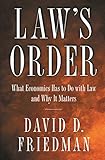Law's Order : What Economics Has to Do with Law and Why It Matters / David D. Friedman.
Material type: TextPublisher: Princeton, NJ : Princeton University Press, [2001]Copyright date: ©2001Description: 1 online resource (344 p.) : 1 line illus., 4 tablesContent type:
TextPublisher: Princeton, NJ : Princeton University Press, [2001]Copyright date: ©2001Description: 1 online resource (344 p.) : 1 line illus., 4 tablesContent type: - 9780691090092
- 9781400823475
- 330.1
- HB171 -- F768 2000eb
- online - DeGruyter
- Issued also in print.
| Item type | Current library | Call number | URL | Status | Notes | Barcode | |
|---|---|---|---|---|---|---|---|
 eBook
eBook
|
Biblioteca "Angelicum" Pont. Univ. S.Tommaso d'Aquino Nuvola online | online - DeGruyter (Browse shelf(Opens below)) | Online access | Not for loan (Accesso limitato) | Accesso per gli utenti autorizzati / Access for authorized users | (dgr)9781400823475 |
Frontmatter -- Contents -- Introduction -- 1. What Does Economics Have to Do with Law? -- 2. Efficiency and All That -- 3. What's Wrong with the World, Part 1 -- 4. What's Wrong with the World, Part 2 -- 5. Defining and Enforcing Rights: Property, Liability, and Spaghetti -- 6. Of Burning Houses and Exploding Coke Bottles -- 7. Coin Flips and Car Crashes: Ex Post versus Ex Ante -- 8. Games, Bargains, Bluffs, and Other Really Hard Stuff -- 9. As Much as Your Life Is Worth -- Intermezzo. The American Legal System in Brief -- 10. Mine, Thine, and Ours: The Economics of Property Law -- 11. Clouds and Barbed Wire: The Economics of Intellectual Property -- 12. The Economics of Contract -- 13. Marriage, Sex, and Babies -- 14. Tort Law -- 15. Criminal Law -- 16. Antitrust -- 17. Other Paths -- 18. The Crime/Tort Puzzle -- 19. Is the Common Law Efficient? -- Epilogue. What We Have Been Doing for the Past Nineteen Chapters, or a Rough Sketch of an Elephant -- Index
restricted access online access with authorization star
http://purl.org/coar/access_right/c_16ec
What does economics have to do with law? Suppose legislators propose that armed robbers receive life imprisonment. Editorial pages applaud them for getting tough on crime. Constitutional lawyers raise the issue of cruel and unusual punishment. Legal philosophers ponder questions of justness. An economist, on the other hand, observes that making the punishment for armed robbery the same as that for murder encourages muggers to kill their victims. This is the cut-to-the-chase quality that makes economics not only applicable to the interpretation of law, but beneficial to its crafting. Drawing on numerous commonsense examples, in addition to his extensive knowledge of Chicago-school economics, David D. Friedman offers a spirited defense of the economic view of law. He clarifies the relationship between law and economics in clear prose that is friendly to students, lawyers, and lay readers without sacrificing the intellectual heft of the ideas presented. Friedman is the ideal spokesman for an approach to law that is controversial not because it overturns the conclusions of traditional legal scholars--it can be used to advocate a surprising variety of political positions, including both sides of such contentious issues as capital punishment--but rather because it alters the very nature of their arguments. For example, rather than viewing landlord-tenant law as a matter of favoring landlords over tenants or tenants over landlords, an economic analysis makes clear that a bad law injures both groups in the long run. And unlike traditional legal doctrines, economics offers a unified approach, one that applies the same fundamental ideas to understand and evaluate legal rules in contract, property, crime, tort, and every other category of law, whether in modern day America or other times and places--and systems of non-legal rules, such as social norms, as well. This book will undoubtedly raise the discourse on the increasingly important topic of the economics of law, giving both supporters and critics of the economic perspective a place to organize their ideas.
Issued also in print.
Mode of access: Internet via World Wide Web.
In English.
Description based on online resource; title from PDF title page (publisher's Web site, viewed 30. Aug 2021)


